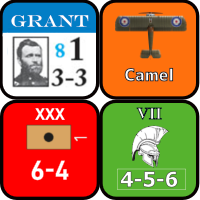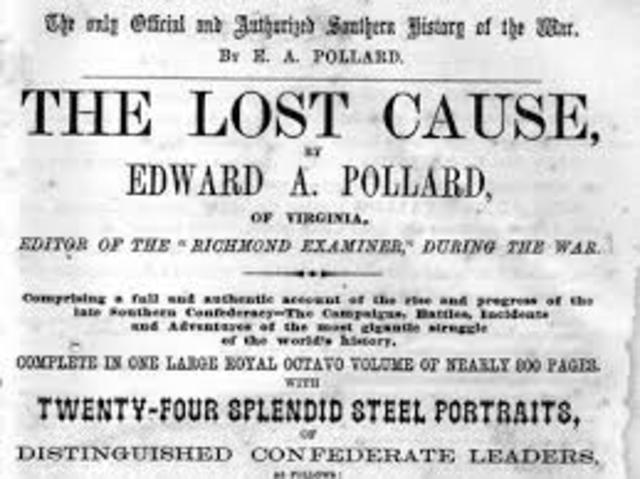Have you listened to the podcast, We Intend to Move on Your Works? It’s part of the Homo Ludens podcast feed. It’s a really interesting project where two players are working their way through a huge number of American Civil War titles, for the most part chronologically by battle. Each episode they look at a specific battle, give its history, and then tell us about the game they played on it. And then they also give their thoughts on if or how the design has been influenced by the Lost Cause movement.
For those unfamiliar, the Lost Cause movement was an effort after the war to cast the Confederacy in a more favourable light. It tries to make the south look like valiant but doomed defenders who never had a chance against the northern aggressors. It does many things, but chief among them is it denies that the war was fundamentally about slavery. The Lost Cause line of thought has been thoroughly rebuffed and discounted, but it still has its adherents. Not to mention its effect on history. All those confederate statues that are being mothballed or pulled down? They were all put up as part of the Lost Cause narrative. So even though it’s clear that the Lost Cause is bogus, its effect linger in books and imaginations, and that filters into the games we play.
Anyway, the two players, Stuart and Pierre, and their host Fred Serval, grapple with the thorny question of whether or not each game in question has any residue of Lost Cause thinking in it. I sometimes feel Stuart finds more than is there, but he’s more knowledgeable on the subject than me, so perhaps he’s right. I have to say, his historical notes on each battle before they start talking about the game is my favourite part of each episode. Stuart is well-read on the war and has an extensive knowledge of the battles and the overall war. As well, though he now resides in Ireland (I think), he’s a born and bred Virginian, so this history is also stuff he grew up with. Land of Lee and all that. (As a side note, on the podcast, Stuart is American, but living in Ireland or somewhere that’s drifted into his speech a bit. Pierre is actually English, and Fred is French. But lives in London, I think. So it’s a great diversity of perspectives from these three.) Hats off to Stuart for coming up with this whole idea and for this whole Lost Cause angle as well. As well as the podcast, Stuart also has a website where he talks about all kinds of games, including the ones in this series, but also other ACW games that they don’t get to or are solitaire.
I mention that, as his blog kicked up a fair bit of pushback a week ago when Stuart published a review of a game on Pickett’s Charge. He liked the game alright, but decreed that the choice of Pickett’s Charge as a topic was a bit of Lost Causism. Pickett’s Charge was the final attack by the Confederates at Gettysburg. It was doomed before it began, Longstreet knew that and was against it, but it went in anyway as Lee wanted it. It has been warped in history into the final highwater mark for the South. But that is only part of why Stuart doesn’t like it.
Stuart objects to the topic in total because if you win, you are winning for the Confederacy and prolonging slavery. He likes the game system, but would prefer it didn’t celebrate a Lost Cause hero, but instead was perhaps about a Union attack.
While I could go along with his desire to not promote or extend the Lost Cause, a little alarm bell went off in my head. It made me ask him how he’d feel about playing the South in a grand strategic game on the war, or the Germans in a similar game on WWII. He said he can’t do it with the Germans (but he doesn’t play much WWII anyway) and he wasn’t sure about the Civil War. So far they were planning mostly battle games, but as Pickett’s Charge showed, he’s sensitive to playing the slavery-promoting side.
In the next episode of We Intend to Move on Your Works, it all came to a head. After another great introduction to the battle of Shiloh, they got down to discussing how much they did not enjoy the game they played, Into the Woods, part of the Great Battles of the ACW series. I haven’t played any GBACW since the early iterations in Strategy and Tactics magazine, but I think I’d probably agree with most of the things they didn’t like about the game. Huge series rulebook and then a huge exclusive game rulebook. Really fiddly procedures. Lots of marker counters. Very long to play even a short scenario. Sounds a lot like stuff I don’t care for either.
But then Stuart asked the killer question. Where are the slaves? In a system so detailed, why are the slaves not represented. If the war is about slavery, why are they not there?
This is where Stuart and I part company. Well, actually I don’t usually like the games he likes and vice versa, but that’s just taste in games. This felt like something bigger.
To me, the reason there are no enslaved people in that game is that it’s a battle game. The war was certainly about slavery, but the individual battles aren’t. Shiloh, I think, was about control of the Tennessee and Mississippi Rivers. Nearby Corinth was a major rail hub.
Those are the objectives. Sure, the larger objectives have to do with the future of slavery in new States and thereby it’s continued existence in the south. But every wargamer knows this or doesn’t want to. There is no need for every battle game to spell this out. My limited imagination has no idea what enslaved units would look like in a game like this, a game that focuses on the military kinetic aspects of the battle. I just fundamentally disagree that a battle game set in the civil war needs to keep the issue of slavery front and center.
Perhaps someone will design a battle game that suits Stuart’s needs. It’s not this one and I guess part of what gets me here is that he is not criticizing the game for what it is, but for not being what he wants it to be. Or perhaps he was just using it to get out his bigger point, that he thinks slavery needs to be highlighted and centered in ACW games. I don’t agree with him. If some players just want games that deal with the military aspects of a battle, or even an entire war, so be it. Perhaps these two reviews by Stuart have hit a nerve with many players because his tone suggests that we are not engaging with history correctly if we don’t follow his lead. I hope not.
When it comes to a grand strategic game of the whole war, Stuart is on firmer ground. Grand strategic games often benefit from the inclusion of politics, even if they only indirectly impact the kinetic events. But I’m still very happy to play a game like Mark Simonitch’s The US Civil War. No counters for enslaved peoples, no real centering of slavery in the game. But when I play, I know what the war is about, whether I’m playing the good guys or not.
This whole thing got me thinking of a couple different players I met who also wouldn’t play the Germans in WWII games. One was very eager to play, so we had a go at a Stalingrad game. I won as the Germans. He complained the game was unbalanced. I offered to switch sides, but he refused to play the Germans. Catch 22.
The other was a fan of Wing Leader, but again refused to play the Germans. Talking to him about it, he went so far as to say he couldn’t play them, and didn’t understand anyone who could. What was he implying? That anyone who played the Germans was somehow a Nazi sympathizer? What about if you played the Soviets? Were you then pro-Stalin? What if you played the British, were you saying you were cool with how Churchill treated the Indians? And then the big one, if everyone who plays the Germans is beneath contempt, who the hell did he expect to play with?
Stuart says he can’t play the Germans because he can’t not think about the holocaust. Fair enough. But that’s not everyone’s experience. I’m glad that he isn’t asking for the holocaust to be centered in every operational or battle WWII game.
We could go on and on with this. I’m sure there’s people who can’t play Labyrinth without thinking of the American use of torture. Or Vietnam games without napalm. Or Pacific WWII games without thinking of the firebombing of Tokyo or Dresden.
But it’s an arbitrary line. All war is an atrocity. When we game it, there’s nothing actually realistic about it. How we compartmentalize it, what parts we as designers and players want to deal with and look at is up to each of us individually. So I totally support Stuart’s right to express his point of view as much as I disagree with it, and I’ll keep listening to the series because, as I said, Stuart’s history lessons are terrific.
This whole issue reflects a wider trend in our hobby. As a recent article in the online magazine Conflict of Interests points out, there are a growing number of folks who want wargames to reflect more than just the military aspects of war. They want political and social issues as well. And I’m all for it. I’m glad to say we’re seeing more and more designers attempt this work. Where I disagree is when I see this new trend being pushed as the “only” way. The Conflicts of Interest article does that a bit which made it an unsatisfying read. And hearing the author interviewed elsewhere didn’t disabuse me of that idea. He seemed to be saying that this was the direction the whole hobby needs to move in. I disagree. It’s certainly _a_ direction the hobby can move in, but not the only one.
To bring this back to the We Intend to Move on Your Works podcast, I hope Stuart gets the games he wants, but only if we all get the games we want. There is room for all.
If you'd like to discuss this, please log in (or register) and post your thoughts in our forums. I think that's safer than allowing anonymous comments for this one. Play nice.



Add comment